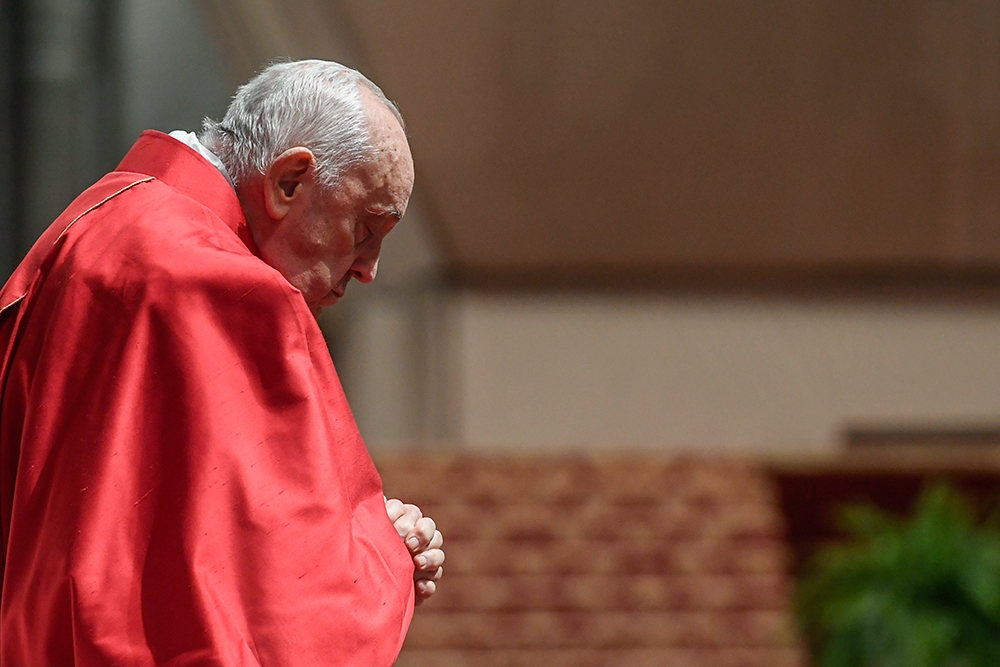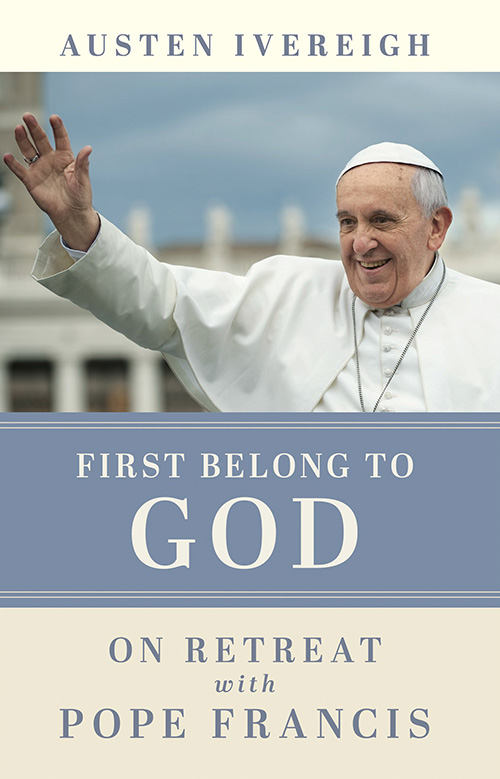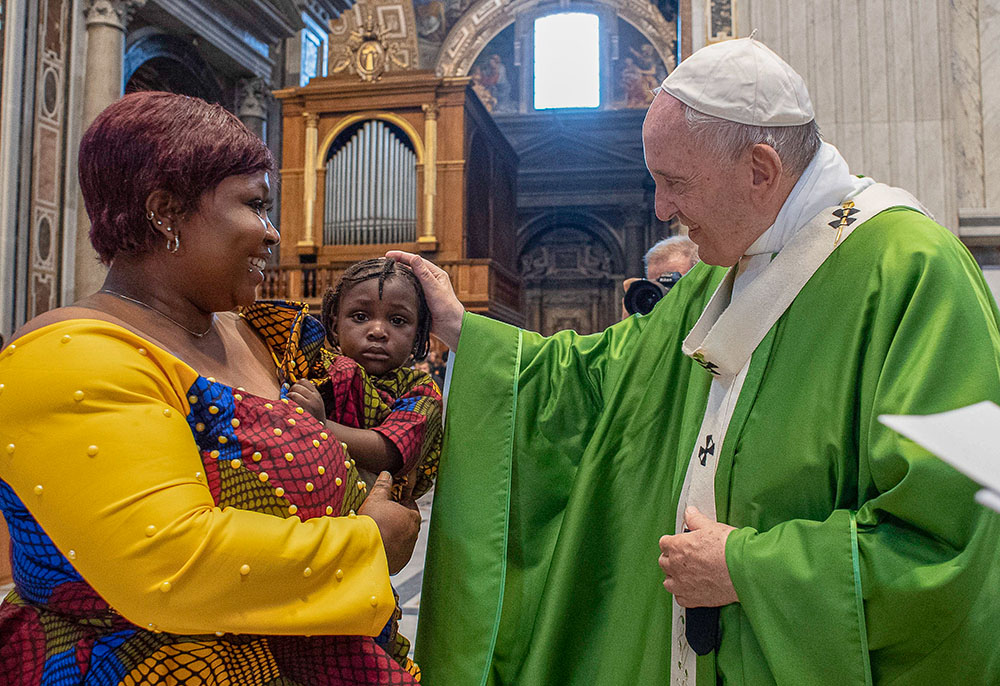
Pope Francis prays during the Good Friday Liturgy of the Lord's Passion in St. Peter's Basilica at the Vatican March 29. (CNS/Vatican Media)

In First Belong to God: On Retreat With Pope Francis, Austen Ivereigh — renowned Francis watcher, writer, journalist, scholar and fellow in contemporary church history at Campion Hall, Oxford — delivers the book I've needed to read.
Ivereigh expands on an eight-day retreat he gave in 2020 to British Jesuits, based on the Spiritual Exercises of St. Ignatius, to deliver a compelling summary and application of Francis' theology. Not the bits and pieces, but the whole of it: from Jorge Mario Bergoglio's early conversion, to his overseeing the historic Aparecida document put forth by the South American and Caribbean clergy in 2007, right up to the talk he delivered in Marseille, France, in September 2023 about the migrant crisis in the Mediterranean.
Ivereigh has the chops: He has previously written two biographies of the pope and co-authored another title with him. In this book, he draws on that work and more primary material, personal talks with the pope and other commentary, including material specifically translated for this book. Always, though, he writes as if to give voice to Francis' own thoughts.
First Belong to God would function well for an individual or group retreat as it follows the classical Ignatian retreat pattern, fully explained in a user guide at the end of the book. Francis, who as a Jesuit would have participated often in such retreats, contributes a concise, prayerful foreword, and Ivereigh, an introductory note about the book's genesis.
Given Ivereigh's ease with Francis' voluminous output, the pope's teachings coalesce into a coherent spirituality, responding directly to the contemporary world.
The retreat aims to stimulate a "primary encounter," namely the deep experience of God's love for participants. The structure of the retreat, with its questions, prayers and recommended texts for further study, leads the way toward a more spiritually alive choice and commitment. Finally, the book concludes with a comprehensive list of sources and an excellent bibliography.
Given Ivereigh's ease with Francis' voluminous output, the pope's teachings coalesce into a coherent spirituality, responding directly to the contemporary world.
As a starting point, Francis insists on threefold belonging: first to God, then to creation and then to each other, our fellow human beings. Many of our current ills stem from our sense of aloneness and the myth of self-sufficiency, and the consequent fears and anxiety and distrust of God, when these defenses inevitably fail. Even as archbishop, Bergoglio had begun his public work of calling for change in a global church which had "closed in on itself."
Francis notes in the foreword that the two great crises of our age — the ecological degradation of our Earth and the mass migration and displacement of people — both stem from this failure of belonging, the failure to remain in right relationship with the rest of creation.
In Day 5, "The Ecology of Mercy," the retreat offers an opportunity to admit that we are in a crisis that requires a wholesale renewal of our relationship with nature and each other. Francis has called this our "Noah moment," with extinction a real possibility.
Ivereigh quotes from the pope's encyclical "Laudato Si', on Care for Our Common Home" to bring attention to the need to act as if creation is for us all to share in common. He makes the jarring observation that "if all lived as Americans do, we would need five planets."

Pope Francis greets a woman and child during a July 8, 2019, Mass in St. Peter's Basilica at the Vatican commemorating the sixth anniversary of his visit to the southern Mediterranean island of Lampedusa. (CNS/Vatican Media)
On Day 7, "The Triumph of Failure," the migrant crisis comes front and center. It is not a separate problem, as so many migrants flee their homes because of ecological disaster.
Ivereigh quotes again the outrage and pain the pope expressed on the island of Lampedusa in July 2013, where so many migrants drowned. Ten years later, the same cruelty continues, and Francis still calls in vain to an indifferent world.
The question retreatants must ask themselves on Day 7 is "How do you understand the idea that migrants and refugees are the 'flesh of Christ'?"
As a Catholic Christian, I always appreciate when our spiritual leader "leads" on a subject about which I am passionate, namely the environment and population displacement. But the synod? Perhaps because of the disillusionment of the past several years, I followed the news, but had low expectations.
No matter how rooted in the early church, what could this reinterpreted synodality mean for us today? What could realistically come from such a divided church?
Until reading this book, I regarded the synod as an administrative overture, not likely to succeed, at least in the way I wanted.
Advertisement
In the face of the obvious challenges, Francis might agree. But he knows what we see is not the full truth. The synod will bear fruit, not because of the goodwill of participants or its ingenious multilayered structure, but because of the Holy Spirit.
Francis began thinking and planning for the synod from the beginning of his papacy. He sees members of a synodal church as "agents of reconciliation and artisans of peace," moved by the Spirit to work toward a common good with others.
Ivereigh quotes Francis as frequently observing, "Ideas can be discussed, but vital situations have to be discerned."
In the words the pope used to open the synod in October 2021, "The Holy Spirit always surprises us, to suggest fresh paths and new ways of speaking."
We shall see, but this book urged me to step into hope.
I can't say that every day's retreat resonated with me as deeply as the ones I've mentioned. Some I will perhaps need to revisit. But, I saw Francis' theology as more than the sum of its parts. He is a visionary, a man of deep spirituality and a human being who speaks prophetically when he says we teeter on a precipice. He uses the full power of his position to wake us up, not just to a renewal of policies, but to a deep renewal of church and humanity.
In First Belong to God, Ivereigh captures both the simplicity of Pope Francis' message and its audacious complexity.







